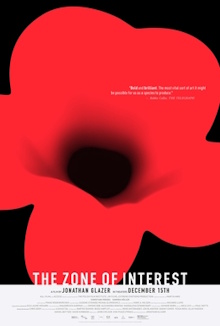Europeans make so many films about the Holocaust that watching yet another one isn’t particularly interesting to me. Jonathan Glazer’s newest one however takes a completely different tack by not showing a single Jewish victim at all. Instead it focuses on the home life of Auschwitz commandant Rudolf Höss whose family has established a mundane and pleasant existence just outside the camp’s walls. There is effectively no plot as it merely shows their everyday routines. Glazer claims that he aimed to demystify the perpetrators of the Holocaust to show that they are not evil in the mythological sense. Yet they most certainly are evil at least in the ordinary sense for being able to enjoy life under such horrendous circumstances.
The films opens with the Hoss family, the commandant and his wife Hedwig with their five children, on an outing in the nearby woods. They fish, swim and return to their spacious home late at night where locals attend to them as domestic servants. We never see Hoss’ work inside the camp but we do see Hedwig running the household with an iron fist, harshly castigating servants who make mistakes. She magnanimously distributes belongings confiscated from Jews and at one point keeps an expensive fur coat for herself. One day, Hedwig’s mother arrives to visit and Hedwig proudly shows her around, especially the swimming pool, her garden and her greenhouse. Her mother is effusive in her praise, marveling at how far Hedwig’s status in life has come since their humble beginnings. But then Hoss is told that he is being promoted and must leave the Auschwitz camp to take up a position at Oranienburg. Hedwig is insistent about staying, claiming that the house is hers. She suggests that they split up temporarily with Hoss living alone to Berlin while she and the children continue to stay at Auschwitz and Hoss reluctantly agrees.
This is the kind of film where you keep waiting for dramatic twist or major reveal and there’s not really one. It’s really just a succession of scenes from what would be an idyllic life if not for the fact that behind the concrete wall that borders their property is all of the suffering of the concentration camp. Perhaps the only moment of self-reflection is when Hedwig’s mother wakes up in the middle of the night, disturbed by the smoke coming from the crematorium and abruptly leaves the next morning. She leaves behind a letter whose contents disturb Hedwig but we never learn what she wrote. There isn’t a single shot of any of the prisoners but we can vaguely hear their suffering in the background and of course we are always conscious that the comfortable life of this family comes at their expense. It is implied that even the fertilizer that makes Hedwig’s gardens look so beautiful are from the ashes of the victims. That Hoss is extremely competent at his job only heightens the sense of horror. He discusses a new crematorium design that has a higher throughput and takes seriously the logistics of expanding the camps to accommodate Hungarian Jews.
Many of the references in the film were too subtle or obscure for me and I had to look them up afterwards. For example, I found Hoss’ memo about picking lilacs odd but I didn’t connect that they were needed to cover the smell of the crematorium. I also couldn’t understand the significance of the negative images showing the girl going out at night to leave behind apples. Reading through online discussions, I realize that there are so many more references that I missed that are open to multiple interpretations. To what extent does Hoss feel guilty about his work? Does he wonder how history will judge him? Why did Hedwig’s mother leave so suddenly? Does Hedwig really kill off servants who annoy her? There are so many questions, but at the end Glazer wants us to arrive at our own conclusions.
The use of the fade to red, the discordant music and the abrupt switch to the present day all contribute to making this a very unsettling and effective film. Glazer is certainly a fascinating filmmaker whose work I haven’t seen enough of. They’re so emotively visceral yet are also intellectually dense. They’re just the kind of thing you’d want to have a discussion over with cinephile friends but this is certainly not a film for casual viewing.
